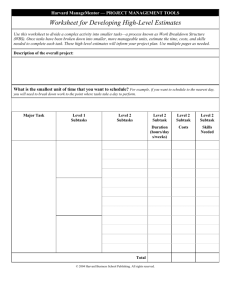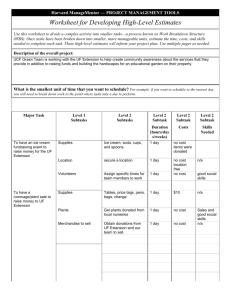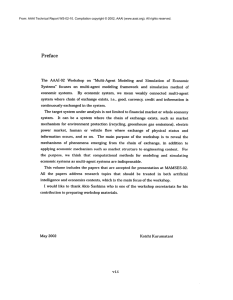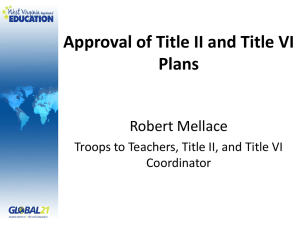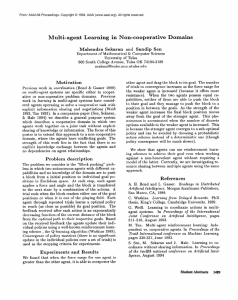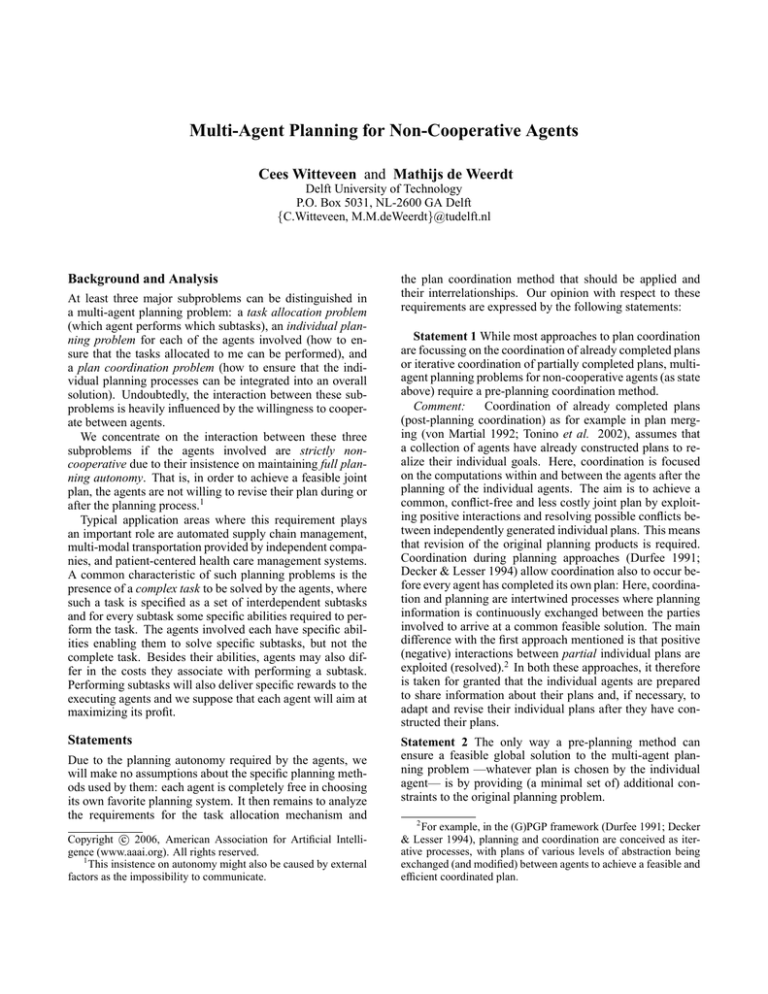
Multi-Agent Planning for Non-Cooperative Agents
Cees Witteveen and Mathijs de Weerdt
Delft University of Technology
P.O. Box 5031, NL-2600 GA Delft
{C.Witteveen, M.M.deWeerdt}@tudelft.nl
Background and Analysis
At least three major subproblems can be distinguished in
a multi-agent planning problem: a task allocation problem
(which agent performs which subtasks), an individual planning problem for each of the agents involved (how to ensure that the tasks allocated to me can be performed), and
a plan coordination problem (how to ensure that the individual planning processes can be integrated into an overall
solution). Undoubtedly, the interaction between these subproblems is heavily influenced by the willingness to cooperate between agents.
We concentrate on the interaction between these three
subproblems if the agents involved are strictly noncooperative due to their insistence on maintaining full planning autonomy. That is, in order to achieve a feasible joint
plan, the agents are not willing to revise their plan during or
after the planning process.1
Typical application areas where this requirement plays
an important role are automated supply chain management,
multi-modal transportation provided by independent companies, and patient-centered health care management systems.
A common characteristic of such planning problems is the
presence of a complex task to be solved by the agents, where
such a task is specified as a set of interdependent subtasks
and for every subtask some specific abilities required to perform the task. The agents involved each have specific abilities enabling them to solve specific subtasks, but not the
complete task. Besides their abilities, agents may also differ in the costs they associate with performing a subtask.
Performing subtasks will also deliver specific rewards to the
executing agents and we suppose that each agent will aim at
maximizing its profit.
Statements
Due to the planning autonomy required by the agents, we
will make no assumptions about the specific planning methods used by them: each agent is completely free in choosing
its own favorite planning system. It then remains to analyze
the requirements for the task allocation mechanism and
c 2006, American Association for Artificial IntelliCopyright gence (www.aaai.org). All rights reserved.
1
This insistence on autonomy might also be caused by external
factors as the impossibility to communicate.
the plan coordination method that should be applied and
their interrelationships. Our opinion with respect to these
requirements are expressed by the following statements:
Statement 1 While most approaches to plan coordination
are focussing on the coordination of already completed plans
or iterative coordination of partially completed plans, multiagent planning problems for non-cooperative agents (as state
above) require a pre-planning coordination method.
Comment:
Coordination of already completed plans
(post-planning coordination) as for example in plan merging (von Martial 1992; Tonino et al. 2002), assumes that
a collection of agents have already constructed plans to realize their individual goals. Here, coordination is focused
on the computations within and between the agents after the
planning of the individual agents. The aim is to achieve a
common, conflict-free and less costly joint plan by exploiting positive interactions and resolving possible conflicts between independently generated individual plans. This means
that revision of the original planning products is required.
Coordination during planning approaches (Durfee 1991;
Decker & Lesser 1994) allow coordination also to occur before every agent has completed its own plan: Here, coordination and planning are intertwined processes where planning
information is continuously exchanged between the parties
involved to arrive at a common feasible solution. The main
difference with the first approach mentioned is that positive
(negative) interactions between partial individual plans are
exploited (resolved).2 In both these approaches, it therefore
is taken for granted that the individual agents are prepared
to share information about their plans and, if necessary, to
adapt and revise their individual plans after they have constructed their plans.
Statement 2 The only way a pre-planning method can
ensure a feasible global solution to the multi-agent planning problem —whatever plan is chosen by the individual
agent— is by providing (a minimal set of) additional constraints to the original planning problem.
2
For example, in the (G)PGP framework (Durfee 1991; Decker
& Lesser 1994), planning and coordination are conceived as iterative processes, with plans of various levels of abstraction being
exchanged (and modified) between agents to achieve a feasible and
efficient coordinated plan.
Comment: This statement immediately follows from the
requirement that the resulting joint plan should satisfy all
the initial constraints. The additional constraints are needed
to ensure the feasibility of the combination of the independently developed plans produced by the autonomous agents.
Examples of this approach are the partitioning methods as
applied by Valk (Valk 2005) and the temporal decoupling
method as specified by Hunsberger (Hunsberger 2002).
Statement 3 Solving the preplanning coordination problem
assumes that it is known which subtasks are allocated to
which agents. On the other hand, the specific set of additional constraints resulting from the coordination process —
and thereby the total plan cost for solving the multi-agent
planning problem— heavily depends on the specific task allocation chosen. Current approaches to task allocation do
not pay attention to complex task specifications and/or allocation of planning constraints. Current approaches to (preplanning) coordination do not take into account cost factors.
Therefore, a careful integration of task allocation and plan
coordination methods is called for in order to minimize the
costs for the actors involved.
Comment: Quite a number of studies have concentrated
on market-based approaches to task allocation in multiagent systems. Typical examples of these studies are the
study of (combinatorial) auctions for task allocation and
coalition formation processes in multi-agent systems and its
relations to combinatorial optimization problems (Gerkey
& Mataric 2004). In most approaches, however, the tasks
described are rather simple: often they consist of a set of
atomic tasks and each of the actors receives one single task
or a subset of tasks. Even if the task description is more
elaborate, as in the Traderbots architecture (Dias & A.Stentz
2003), it is assumed that the set of subtasks does not require
an elaborate planning process to execute. Therefore, the
problem of identifying planning constraints and the problem
of allocating them does not occur in this approach. At
the same time, current plan coordination methods almost
always assume that agents are fully cooperative and/or tasks
already have been allocated to agents. As far as we know
no attention has been paid to plan coordination and task
allocation as intertwined processes where reallocation of
tasks and subsequent replanning of the agents might be
needed to obtain better results.
Summarizing, we conclude that although both task allocation and plan coordination have been given attention to
separately, existing approaches seem to be less suitable to
deal with the complete problem, since (i) task specifications
often are too simple (ii) the interdependency between the
subproblems mentioned is neglected, (iii) almost no interdependency of subtasks assigned to different agents is assumed
and (iv) almost no attention has been paid to the mutual dependencies between task allocation and coordination of selfinterested and competitive agents.
Recommendations We therefore would like to see future
research to concentrate on the following issues:
1. To generalize both current market-based task and plan
constraint allocation methods by taking into account complex tasks consisting of interdependent sets of hierarchically ordered subtasks, enabling the task to be decomposed at several levels of abstraction;
2. To generalize current task allocation methods by providing task allocation methods suitable for handling complex
tasks, developing suitable cost models to handle the allocation of additional plan constraints identified by plan
coordination methods;
3. to extend current methods for plan coordination by
• developing methods for identification of plan constraints using complex task specifications;
• developing cost models for plan constraints and methods to identify cost-minimal sets of plan constraints to
be used by agents for their valuations;
4. to integrate both approaches in a common framework
where task allocation and plan constraint allocation are
considered as intertwined, iterative processes. Here,
special attention will be given to incorporate adaptive
(learning) strategies for agents suitable for repeated task
(re)allocation problems and to re-evaluation methods for
plan constraints aiming at the improvement of overall
profits.
References
Decker, K. S., and Lesser, V. R. 1994. Designing a family
of coordination algorithms. In Proceedings of the Thirteenth International Workshop on Distributed Artificial Intelligence (DAI-94), 65–84.
Dias, M. B., and A.Stentz. 2003. Traderbots: A marketbased approach for resource, role, and task allocation in
multirobot coordination. Technical Report CMU-RI TR-03-19, Robotics Institute, Carnegie Mellon University,
Pittsburgh, PA.
Durfee, E. H. 1991. Organizations, plans, and schedules:
An interdisciplinary perspective on coordinating AI agents.
Journal of Intelligent Systems. Special Issue on the Social
Context of Intelligent Systems.
Gerkey, B. P., and Mataric, M. 2004. A formal analysis and
taxonomy of task allocation in multi-robot systems. In International Journal of Robotics Research, 23(9):939–954.
Hunsberger, L. 2002. Algorithms for a temporal decoupling problem in multi-agent planning. In Proceedings of
the eighteenth national conference on artificial intelligence
(AAAI-2002).
Tonino, J.; Bos, A.; de Weerdt, M. M.; and Witteveen, C.
2002. Plan coordination by revision in collective agentbased systems. Artificial Intelligence 142(2):121–145.
Valk, J. 2005. Coordination in Multi-Agent Systems. Ph.D.
Dissertation, Delft University of Technology.
von Martial, F. 1992. Coordinating Plans of Autonomous
Agents, volume 610 of Lecture Notes on Artificial Intelligence. Berlin: Springer Verlag.

